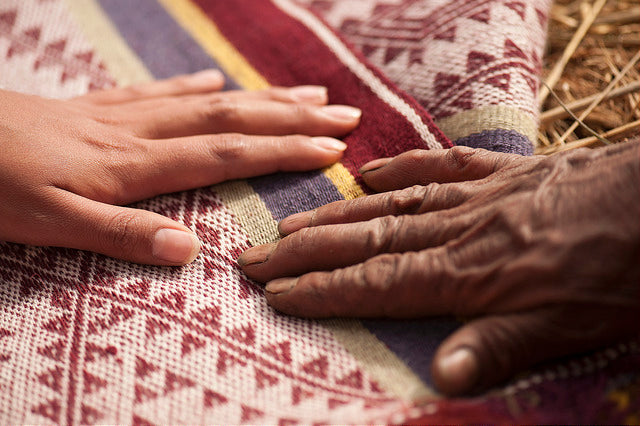What does it mean to be a conscious consumer? We all want to do something good in the world, to make some kind of positive contribution, and shopping consciously can be a good place to start. Stopping to think about where we spend our money and the effects of our purchase is a small act within reach for most of us. A small act - but with big impacts.
Conscious consumerism is a manner of thinking, a way of life, even. Conscious consumers ask themselves questions like, “Where is this company getting their labor from? Do they respect their workers’ rights? What is the carbon footprint of this product? And where do the materials come from?”

Making conscious choices everyday is what being an ethical shopper is all about
Guess what? You can actually make an impact! Our decisions as ethical shoppers do make a difference. Ethical shoppers look for natural fibers vs synthetic, artisan-made vs mass-produced, and transparent vs opaque supply chains. Not only can you avoid contributing to global issues like worker exploitation or environmental degradation by choosing not to purchase that $2 tank top, but you can actually make a positive contribution to someone’s life by choosing handmade.
Handmade Is Human
Choosing artisan-made products is a great way to shop ethically. More often that not, artisans practicing age-old cultural traditions make use of local, natural materials, meaning that the environmental impact of a single artisan-made garment or home good is naturally very low. No industrial manufacturing processes, no toxic chemicals, and no long-distance transport of raw materials. In our case, most of our alpaca ponchos and ruanas use fiber from the artisans’ own alpacas. The fiber is sheared by hand only steps away from their home, spun on a traditional-drop spindle, and then woven on the backstrap loom into soft and luxurious wearable art. Talk about local!

Many of our products use fiber shorn from the weavers' own alpacas, like these cuties in Upis!
In the ethical and sustainable fashion movement, fair wages and human rights matter. Conscious consumers want to make sure that the people down the line are treated fairly. Artisan businesses tend to be small-scale. This makes it hard for them to compete with large corporations and mega brands, but it also means that they are more likely to be able to control all steps of the production process, and ensure that everyone involved, every step of the way, is treated fairly. But many artisan businesses don’t just stop at non-exploitation. The creation of local crafts-based industries can have many positive impacts, from providing new economic opportunities to generating cultural pride and empowering women and other marginalized populations.

This is not to say that all artisan brands alike, and it can be really hard to distinguish the real deal from imposters. Certification standards vary and are expensive to obtain – out of reach for many small artisan businesses. So how can the ethical shopper make good choices? By doing what they do best – staying informed! An ethical shopper is an educated one. Transparency is the new gold standard, and the more open a brand is about who they work with and how, the more confident you can feel that your hard-earned dollar is working double-time and making a real impact for the good of people and the planet.

Being a conscious consumer takes effort but like anything, with effort comes reward! Knowing that you have the power to actually help another human being and the planet, well, that’s the best gift money can buy.
For more great tips about how to shop ethically, check out this Sustainable Shopping Guide from Racked.
Written by Scott Douglas Jacobsen, founder of In-Sight Publishing and In-Sight: Independent Interview-Based Journal, and edited by Sarah Confer.

